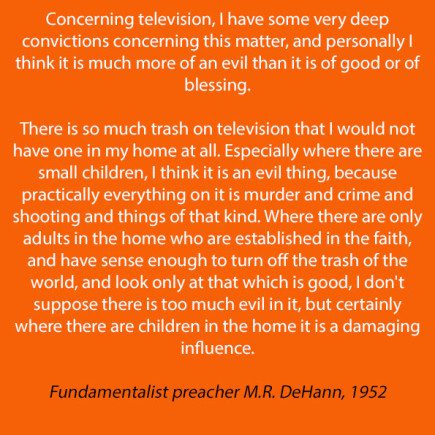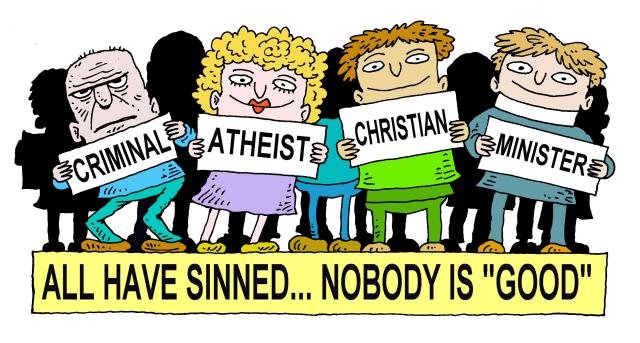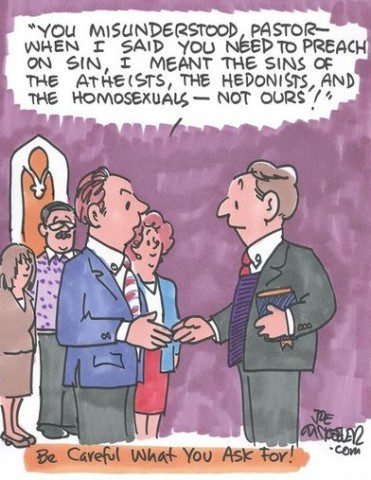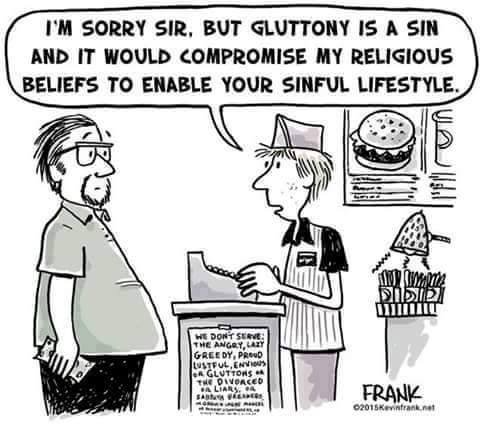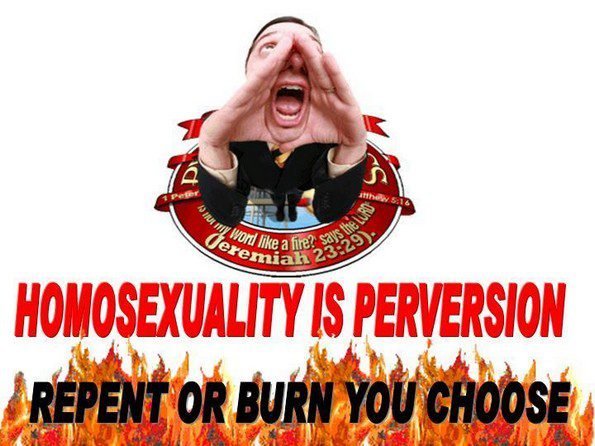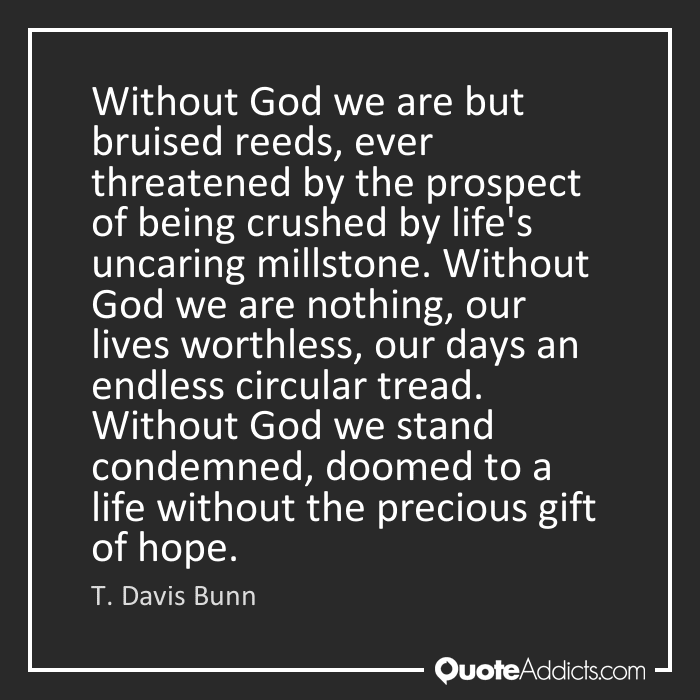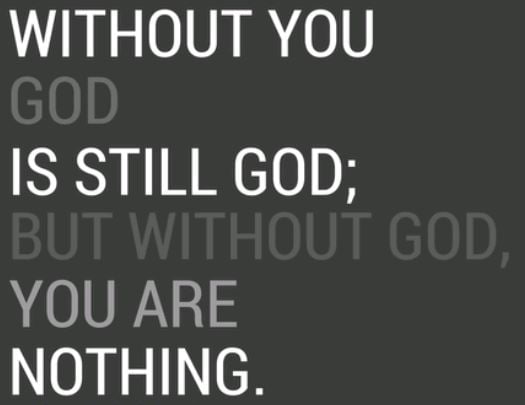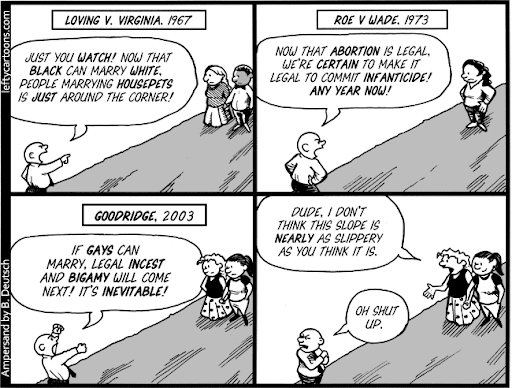
According to the Bible, sin is transgression of the law of God. (1 John 3:4) Evangelicals, as a general principle, believe this to be true. However, when it comes to what, exactly, is the law of God — well, let the battle begin. Every sect and every pastor has their own idea about what constitutes God’s law. None of them actually follows and practices ALL the laws found in the Bible. Every follower of Jesus picks and chooses, cafeteria-style, which laws to obey and which to ignore.
Several years ago, a local group posted on Facebook that they were having a Black Lives Matter/Pride rally. An Evangelical woman responded by posting comments about the evil of homosexuality, complete with Bible verses. I responded, so, you believe LGBTQ people, adulterers, fornicators, non-virgins, and Mormons should be executed? After all, that’s what God commands in the Bible. Of course, she ignored my challenge to her hypocritical use of the Bible to condemn behaviors she doesn’t like, choosing, instead, to attack me personally.
This woman is not unique in any way. I don’t know of one Evangelical who believes and practices every law in the Bible. Granted, Evangelicals have all sorts of lame explanations for their duplicity, but the fact remains that Evangelicals practice pick-and-choose Christianity. (Please see Should Christians Keep the Old Testament Law?)
For the sake of this post, I am going to assume that every Evangelical extracts from the Bible certain laws, commands, and precepts to govern their lives; that transgressing these edicts are sins.
I grew up in the Independent Fundamentalist Baptist (IFB) church movement, attended an IFB college, and pastored Evangelical churches for 25 years. Over the 50 years I spent in the Christian church, I heard lots of preaching against sin — generally and specifically. I preached hundreds of sermons myself against this or that sin. Convincing people that they are sinners is the precursor to salvation. Without sin, there’s no need for salvation. Remove sin, fear, and guilt from the equation, and Evangelical churches will empty out overnight.
Once saved, Evangelicals continue to battle against what they call “indwelling sin.” Surprisingly, having God as your Father, Jesus as your BFF, the Holy Ghost living inside of you, and having at your fingertips the inspired, inerrant, infallible Word of God is not enough to keep Evangelicals from sinning daily in thought, word, and deed. It seems that Evangelicals sin just like their counterparts in the evil, Satan-controlled world. That’s why Evangelical preachers spend an inordinate amount of time preaching against sin to mostly Christian crowds.
Supposedly, Evangelicals are to grow and mature in their faith. One would think that sin would become less of a problem as Evangelicals became more intimate with Jesus. However, as any honest Evangelical pastor will tell you, worldliness, carnality, and sinfulness are common among God’s chosen ones. Jesus is no cure for the human condition.
Evangelical preachers often warn congregants of the danger of the slippery slope. These so-called men of God believe that a behavior deemed sinful, if unconfessed and not forsaken, leads to more serious sinful behaviors. Let me give readers several examples.
Evangelicals believe that it is sinful to use street drugs. Marijuana is considered a gateway drug that opens people up to using harder, more addictive drugs. I came of age in the 1970s. I heard numerous sermons about the evils of drug use — especially marijuana. Numerous church teens were dope smokers. So were my classmates at Findlay High School. It was not uncommon to see people smoking marijuana in the restrooms. Anti-drug preachers posited that marijuana use led to more serious drug use. Start smoking marijuana, and down the slippery slope you will go, ending up a heroin addict. Don’t want to be a heroin addict? the thinking went. Don’t smoke marijuana. Of course, few of my fellow youth group members or school classmates became mainline heroin users. I am sure more than a few of them tried LSD or other psychedelics, but hardcore heroin users? It didn’t happen.
The IFB preachers of my youth loved to preach against sexual sin. I, of course, continued in their footsteps, spending significant time over the years condemning illicit, sinful sexual behavior. I embarrassingly told church teens in one sermon (1980s) that I never knew of a girl who got pregnant who didn’t hold hands with a boy first. The slippery slope . . .

When it came to sexual sin, the slippery slope argument went something like this. Couples who hold hands will tire of it and want more intimacy. Thus hand-holding leads to kissing, and kissing leads to petting, which leads to fornication. Want to avoid committing fornication? Never hold hands. (Never asked was WHY should we want to avoid sexual intercourse?) This thinking led the churches I grew up in and the college I attended to develop bizarre anti-human rules. I would later pass on those same rules to churches I pastored. (Please see Thou Shalt Not Touch: The Six-Inch Rule.)
A similar argument is used for pornography. People who view porn grow tired of it, seeking out more explicit content, ultimately leading to sexual assault and rape. That’s right. It is just a hop, skip, and jump from YouPorn to becoming a serial rapist.
The slippery slope is a tool used by Evangelical preachers to scare people into conformity. Remember, the goal is always obedience and conformity. Whatever a preacher thinks the law of God is, his goal is lock-step compliance from congregants with his interpretations of the Bible.
Of course, this approach does not work. Outwardly, it does, but when Evangelicals are on their own, safe in the privacy of their homes and automobiles, no regard is paid to the slippery slope. Sure, sinning Evangelicals have to deal with fear and guilt, but these things are not enough to keep them from behaving in normal, healthy human ways. Any preacher is deluded who thinks that by railing against marijuana and hand-holding he is going to keep church teens and young adults from partying and fornication. Human want, need, and desire win every time.
But, Bruce, for some people, the slippery slope is a real problem. Yep, any of us can and do give in to excess. Most people can drink alcohol without becoming alcoholics. That some people become alcoholics is regrettable, but should we ban the sale and use of alcohol? The same can be said for illicit drugs. Anything can be abused and misused. For example, Polly makes me an angel food cake every year for my birthday. I LOVE angel food cake. I mean I really, really, really love it. I can, I kid you not, eat a whole cake by myself. And it is for that reason that Polly only makes me an angel food cake once a year.
We all have habits and desires that seem excessive to others not so inclined. When sin and the slippery slope are removed from the discussion, it becomes easier for us to understand why we do the things we do. Our three oldest sons grew up poor. Rarely, did they get new clothes or shoes. To this day, they talk of the ugly colored Converse tennis shoes I bought them on close-out at Big Lots. Virtually every bit of their clothing either came from their grandparents at Christmas, Goodwill, or hand-me-downs. The boys owned plenty of jeans adorned with iron-on patches. Such was life in the Appalachian hills of southeast Ohio. Fast forward to when the boys were older and had good jobs. Their closets were filled with expensive clothing and shoes. Why, they even had more than one pair of shoes! It’s not hard to draw a line from their upbringing to their extravagance as young adults. One of my sons refuses to let his children wear cast-off shoes to school. His ex-wife is fine with the children wearing $5 shoes from Goodwill. Not my son. It ain’t going to happen! Why? I suspect he remembers his days attending a private Christian school; how his shoes were old, cheap, and shabby compared to those worn by his classmates.
We have a new 2020 Ford Edge, by far the most expensive car we have ever owned. As I reflect on our evolving car-buying habits over the past decade or so, it is evident that decades of driving rust-buckets deeply affected our view of automobiles. We want, dare I say “need” newer cars. I can give all sorts of reasons for buying newer cars, but the real reason is that we enjoy owning a new car. I suspect all of us have similar “needs” in our lives.
My point is this, once we are free of guilt- and fear-inducing sin, we are free to live life on our own terms. Each to his or her own, right? While I think the slippery slope argument has merit in some circumstances, for the most part it is little more than an attempt to control human behavior. Smart are those who recognize where in their life the slippery slope lurks. I am a retired professional photographer. Due to my inability to properly hold my cameras due to loss of strength, I was forced to liquidate my equipment. Photographers must be aware of the slippery slope — also known as gear acquisition syndrome (GAS). Photography is not a cheap hobby. I invested thousands of dollars in camera bodies, lenses, flashes, studio equipment, and miscellaneous equipment. It was really easy for me to want (need) new equipment. Every couple of years, Sony came out with new camera bodies, always with higher resolution sensors and new bells and whistles. GAS really kicked in for me when they did. But I eventually learned to not give in to my wants, knowing that doing so would send me careening down the slippery slope that leads to a pile of debt. I knew that it was the photographer, and not the equipment (generally), that made the picture. Sometimes, I failed to reign in my desires. I suspect most of you know what I am talking about. We all have things we are passionate about, things we are willing to spend money on. Don’t get me started on my hats. God, I’m addicted.
For those of you who are ex-Evangelicals, did your pastors use the slippery slope analogy to demand obedience and conformity? Do you still have a problem with guilt and fear over human behaviors you know aren’t sinful, yet you can’t shake the voice of your pulpit-thumping preacher in your head? If you no longer buy into the Christian concept of “sin,” how do you order your life and make decisions these days? Please share your stories in the comment section.
Bruce Gerencser, 66, lives in rural Northwest Ohio with his wife of 45 years. He and his wife have six grown children and thirteen grandchildren. Bruce pastored Evangelical churches for twenty-five years in Ohio, Texas, and Michigan. Bruce left the ministry in 2005, and in 2008 he left Christianity. Bruce is now a humanist and an atheist.
Connect with me on social media:
Your comments are welcome and appreciated. All first-time comments are moderated. Please read the commenting rules before commenting.
You can email Bruce via the Contact Form.

